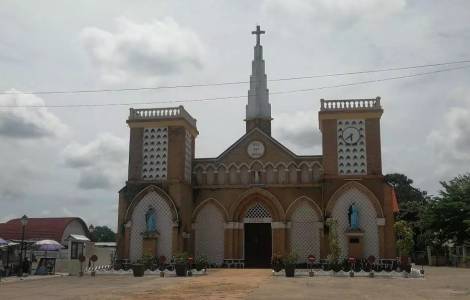
Brazzaville (Agenzia Fides) - "Something evil can lead to a good thing" writes to Fides Don Armand Brice Ibombo, priest and teacher in the Republic of Congo, in describing the consequences of the pandemic due to Covid-19 in his Country. In Congo Brazzaville the first cases were reported on March 14th. Immediately after "the period of health emergency begins, with the closure of the places that can favor the development of the virus, such as schools, offices, places of worship, restaurants, stadiums, etc." recalls Don Ibombo. "In his message of March 28 the President of the Republic, decreed the state of health emergency, with the obligation of confinement at home and a curfew from 8 pm to 5 am".
Of course, "the religious aspect was strongly influenced by the coronavirus, because as in most Countries, it was decided to close the places of worship, forcing Christians to pray and meditate at home or to follow the celebrations on television, without physical contact with their brothers and sisters", recalls Don Ibombo. "The coronavirus has given many Christians the ability or the will to pray and has developed other values that are often ignored or neglected. For example, with confinement, coronavirus revealed the importance of personal and family prayer. Those who have difficulty praying alone and at home were forced to do so during this period so as to cultivate an intimate and profound relationship with God, far from the parish community", stresses the priest.
"The coronavirus has made families aware of their vocation as "domestic churches", that is to say the first place of education for prayer and the values of life", remarks Don Ibombo.
"Even from a social point of view, some have lived a close-knit family life, in which the whole family sees each other, lives together from morning to night, because there are no extra-family activities to carry out. Even those who worked during this period (in activities deemed necessary and essential) the impact was positive for families, because after work they hurried back to their family. In short, coronavirus has undoubtedly strengthened ties and relationships in many families, apart from the boredom caused by the effect of mandatory domestic confinement", says the priest.
However, families have faced serious economic difficulties, because most Congolese live day by day carrying out informal activities that have been blocked by pandemic containment measures.
"In Congo, only a few families have been lucky to benefit from the Lisungi project (a program to help poorer families), but it is a simple minority at the expense of the vast majority of families", says Don Ibombo, according to whom "the Congolese State should follow the example of developed countries by creating food reserves to be used during disasters or times of crisis, such as what we are experiencing".
In conclusion, according to Don Ibombo "much remains to be done in terms of prevention, management of conflicts and natural disasters. Nobody predicted the coronavirus, this is true, but we can already use this crisis for the future, because ‘a man forewarned is forearmed’", says the popular saying. (L.M.) (Agenzia Fides, 22/6/2020)